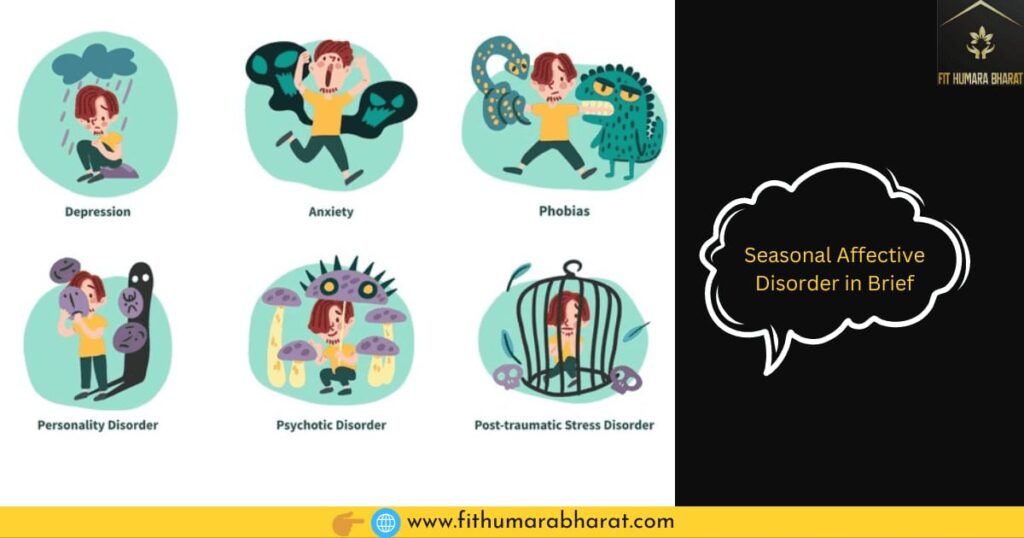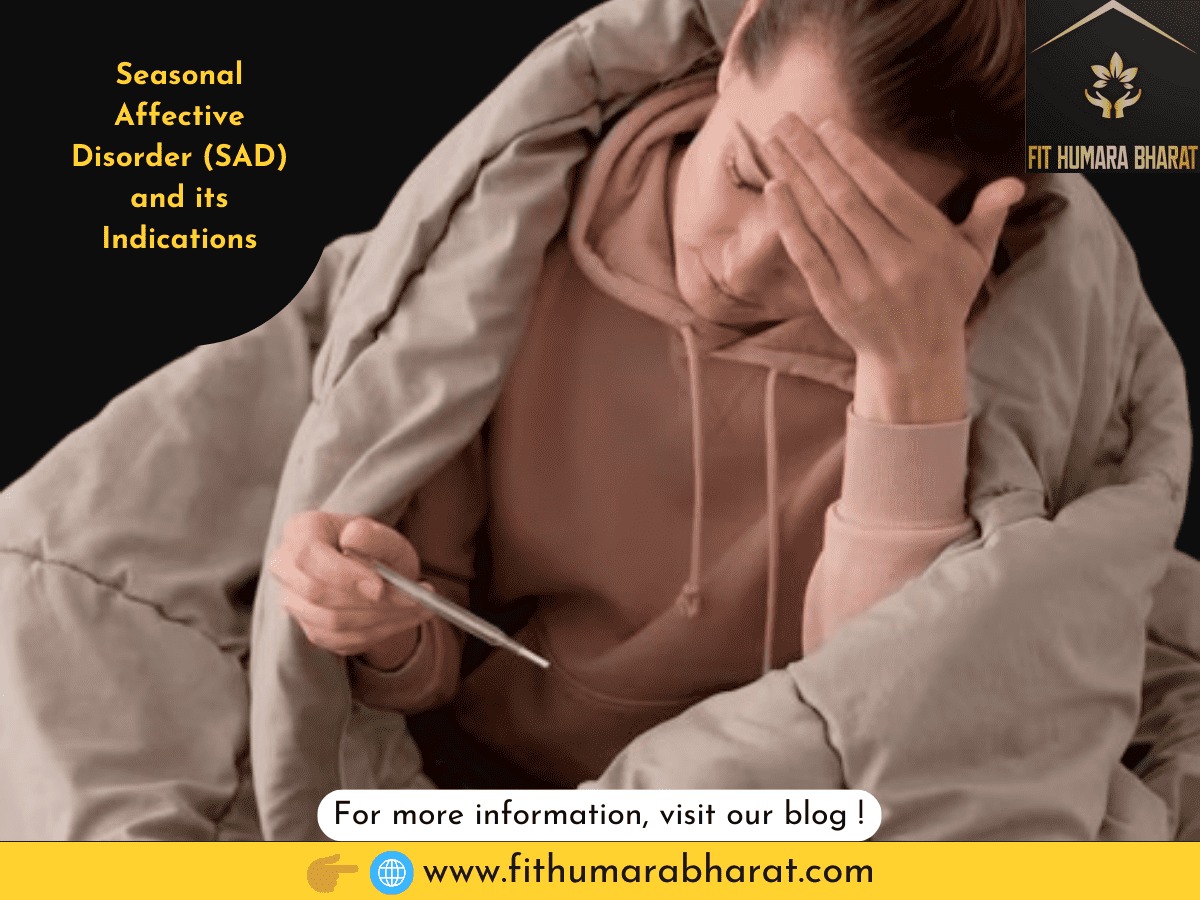With the changing of the seasons, individuals often undergo fluctuations in their mood and vitality. While it’s typical to feel more sluggish as the colder, darker months descend, certain individuals grapple with a more profound challenge recognized as Seasonal Affective Disorder (SAD). SAD is a variant of depression that emerges in conjunction with shifting seasons, typically commencing in late autumn or early winter and subsiding in the springtime.

Seasonal Affective Disorder in Brief
Seasonal Affective Disorder, commonly abbreviated as SAD, is a recurring depressive condition that aligns with particular times of the year. It is typified by a distinct array of symptoms that materialize during specific seasonal periods. The prevalent form of SAD emerges during the fall and persists through the winter season. Nevertheless, some individuals encounter a less common variant termed “summer-onset SAD,” with symptoms arising in late spring and summer.
Prominent Symptoms of SAD
- Dismal Mood: Individuals grappling with SAD frequently endure persistent sentiments of dejection, despair, and irritability. This emotional ebb profoundly affects daily functioning and overall quality of life.
- Lethargy: Fatigue and diminished energy levels constitute prevalent manifestations of SAD. Many individuals encounter challenges summoning the impetus to partake in their customary activities.
- Alterations in Sleep Patterns: Sleep disturbances are a frequent accompaniment to SAD. These may manifest as excessive sleep, an amplified requirement for slumber, and difficulties in waking in the morning.
- Fluctuations in Weight: Appetite and weight alterations are frequently noted. A substantial proportion of individuals grappling with SAD develop an increased appetite, particularly for comforting, carbohydrate-rich foods, which can culminate in weight gain.
- Cognitive Impairment: SAD encompasses reduced concentration and challenges in sustaining focus, thereby hindering the performance of tasks demanding mental acuity.
- Social Isolation: SAD-afflicted individuals may disengage from social engagements, favoring solitude over communal interaction. This isolation can exacerbate symptoms and impede recovery.
- Waning Interests: A diminished inclination towards activities that previously elicited pleasure is a quintessential indicator of depression, which encompasses SAD.
Unraveling the Underlying Causes of SAD
While the precise etiology of SAD remains somewhat elusive, various contributory factors are believed to engender its onset:
- Sunlight Deficiency: SAD is frequently associated with the diminished exposure to natural sunlight during the winter months. The dearth of sunlight can disrupt the body’s circadian rhythm, perturbing the production of melatonin and serotonin, both of which play pivotal roles in mood and sleep regulation.
- Biological Factors: Individuals afflicted by SAD may carry a genetic predisposition for the disorder. Imbalances in neurotransmitters, notably serotonin, are conjectured to play a role in its development.
- Circadian Rhythm Disruption: The changing seasons exert an influence on the body’s internal clock, or circadian rhythm. This can trigger SAD symptoms, including disturbances in sleep patterns and mood fluctuations.
- Vitamin D Insufficiency: The reduced exposure to sunlight during the winter months can result in depleted vitamin D levels, a nutrient intimately linked to mood disorders, inclusive of depression.
Naturopathy and SAD: A Comprehensive Approach
Naturopathy, a holistic approach to health and wellness, proffers an extensive arsenal of remedies for addressing SAD and its associated symptoms. These encompass the following facets:
- Light Therapy: Naturopathy recognizes the pivotal role of light in sustaining health. Phototherapy, or light therapy, is a prevalent naturopathic strategy for managing SAD. It entails the utilization of specialized light boxes that emit luminous, full-spectrum light, emulating natural sunlight. Routine light therapy sessions, typically administered in the morning, contribute to circadian rhythm regulation, mood elevation, and amelioration of SAD symptoms.
- Dietary Adjustments: Naturopathy attaches great significance to dietary choices in achieving optimal health. Dietary modifications may involve augmenting the consumption of mood-enhancing foods rich in vitamins and minerals, such as fruits, vegetables, and omega-3 fatty acids. Simultaneously, curtailing the intake of processed foods, sugar, and caffeine can be recommended to stabilize mood and energy levels.
- Herbal Remedies: Naturopathy harnesses herbal remedies to alleviate SAD symptoms. Certain herbs, such as St. John’s Wort and Rhodiola, exhibit mood-enhancing properties and may be prescribed by naturopathic practitioners to bolster mental well-being.
- Vitamin D Supplementation: Rectifying vitamin D deficiency occupies a pivotal role in naturopathic strategies for mitigating SAD. Naturopathic physicians may advocate vitamin D supplementation, particularly for individuals beset by insufficient levels of this vital nutrient.
- Lifestyle Adjustments: A holistic approach to SAD encompasses the adoption of lifestyle changes that promote overall well-being. These could encompass stress-reduction techniques, regular physical activity, and adherence to a consistent sleep regimen.
- Mind-Body Therapies: Naturopathy frequently integrates mind-body therapies such as meditation, yoga, and acupuncture to alleviate SAD symptoms. These modalities aid individuals in managing stress, enhancing mood, and augmenting overall resilience.
Seasonal Affective Disorder (SAD)
It is a subtype of depression closely intertwined with seasonal transitions, especially those ushering in colder, darker months. While the exact cause of SAD remains somewhat shrouded in mystery, it is undeniably recognized as a genuine mental health condition distinguished by distinct symptoms. Naturopathy, as a holistic approach to health and wellness, extends a diverse array of tools for addressing SAD and its manifestations.
Naturopathic approaches to Seasonal Affective Disorder (SAD) encompass a thoughtful and individualized strategy. These holistic methods, ranging from light therapy and dietary adjustments to the integration of herbal remedies and lifestyle modifications, are meticulously tailored to meet the unique needs of each person, with the overarching goal of providing relief and restoring a sense of equilibrium. This personalized approach addresses the multifaceted aspects of SAD, encompassing the physical, emotional, and mental dimensions, thereby granting individuals the tools to effectively manage their condition and enhance their overall well-being, particularly during the challenging winter months.
If you, or someone you know, finds themselves contending with the challenges of SAD, it is advisable to consider seeking guidance from a qualified naturopathic practitioner. These professionals can create a holistic, customized treatment plan that is not only effective but also aligns with the individual’s specific circumstances and requirements, offering a beacon of hope during the dark and daunting winter season.
Thank You 
- Seasonal Affective Disorder: An Overview of Assessment and Treatment Approaches
- Seasonal Affective Disorder (SAD): More Than the Winter Blues
- Seasonal affective disorder, winter type: current insights and treatment options
- Seasonal affective disorder and engagement in physical activities among adults in Alaska
- What is seasonal affective disorder?



 Sources
Sources